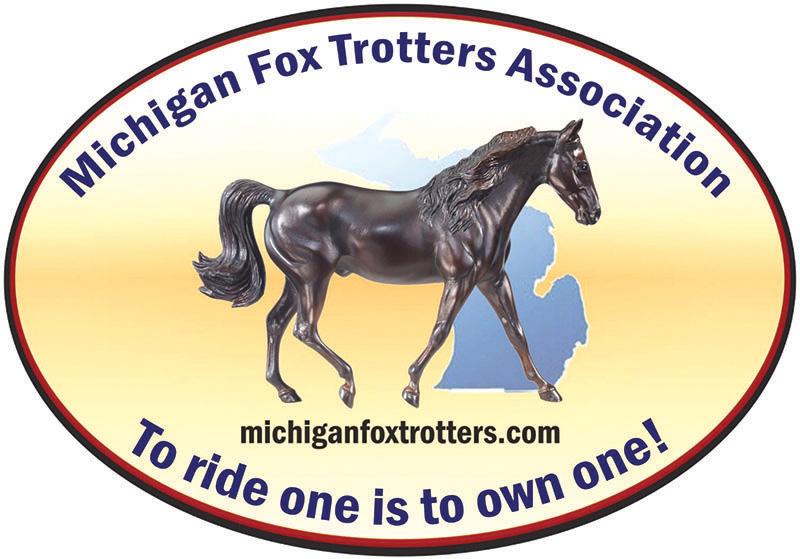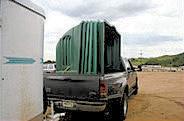






In today’s sneakerhead craze, humans are extending their shoe “drip” to horses who can now have trendy kicks for the first time, a company says.


Marcus Floyd, a 39-year-old sneaker designer based in Kentucky, is offering his innovative sneakers

fitted for horse hooves to the world’s most elite equine athletes in “the horse capital of the world,” VisitLEX, Lexington's convention and visitors bureau, said in a statement.
“If LeBron James can have his own custom sneakers, why shouldn’t American Pharoah?” said Mary Quinn Ramer, President of VisitLEX.

In partnership with VisitLEX, Floyd’s business Horse Kicks, which is not affiliated with Nike, New Balance or Adidas, specializes in using human sneakers to bring fashionable footwear to the surrounding Lexington horse farms. A horse named Bear became the “poster-horse” for Horse Kicks by starring in the brand’s photography and teaser video as the first horse to don a sneaker made by Floyd.
Floyd learned how to do reconstruction while studying at The Shoe Surgeon’s SRGN Academy in Los Angeles, the statement said.
“As far as I know, I’m the only one in Kentucky doing cut and sew reconstruction of sneakers, and definitely the only one in the world doing it for horses,” Floyd said in the statement. “It was a unique challenge for sure.”

The sneakers, which are taken apart and reconstructed on top of a common protective boot made specifically for horses, are finished with Floyd’s


equine-esque logo.
The debut sneaker line was on display during a pop-up event in Lexington during this year’s Breeders’ Cup Festival November 4 and 5.

“It spotlights Lexington’s creative culture and one of our most talented artists in Marcus,” Ramer said.
Three “one-of-a-kind” sneakers from this collection were donated and auctioned off during the Sneaker Ball Lex event in Lexington on Saturday, November 12. To order a pair of sneakers, inquire at horsekickslex.com.


AP
LEXINGTON, KY.
3-year-old colt was taken to the barn for evaluation and was stable and comfortable.
—
Three horses, including one trained by embattled Hall of Famer Bob Baffert, were observed for medical issues after being pulled up in separate races during the Breeders' Cup championships at Keeneland.
Baffert-trained Messier, competing for the first time since finishing 19th in the Kentucky Derby, was pulled up after the second race after jockey John Velazquez observed bleeding. The
Baffert is back in Kentucky this week for the first time since Kentucky stewards suspended him for 90 days last spring for a failed post-race drug test by Medina Spirit. The colt was disqualified and taken down as 2021 Kentucky Derby winner, and Mandaloun elevated to champion.
Epicenter was pulled up in the Breeders' Cup Classic by jockey Joel Rosario on the backstretch with a fractured right forelimb. The race's 5-1
second choice trained by Hall of Famer Steve Asmussen, walked onto the equine ambulance and was taken to Rood & Riddle Equine Hospital, where he will undergo surgery in the morning.
British gelding Domestic Spending was pulled up by jockey Flavien Prat just off the far turn during the $2 million Breeders’ Cup Mile. Trainer Chad Brown later tweeted that the horse sustained a serious pelvic fracture and was stable at Rood & Riddle.





Hello December! Time is sure flying!!
Marilyn Mannino Marilyn ManninoAt our November meeting we elected some new officers for 2021. Congratulations go out to Bob Howell elected as the new MFTA President, Kathy Kruch is now VP, Marilyn is still Secretary/Treasurer, Char Ostrom is the new 2-year Director and Miranda Mannino is now the 1-year Director.
Hello April! Spring is upon us! People are out Fox Trotting and enjoying the weather. Many are accumulating points in the Versatility Challenges that we are offering.

We are accepting membership renewals and new memberships for 2021 now. Youth are encouraged to join too! Go to www.michiganfox trotters.com to print off the form. You will learn alot from our members about the history of Fox Trotters,their uses and availability and be able to network with those of us who camp,train and show them. Our association is blessed to have skilled trainers,breeders and a farrier to learn from. We love promoting this breed as they have great personalities,are so versatile and come in many sizes and different coat colors. A benefit to joining is that we can offer clinics at a reduced price to our members. Due to Covid we are meeting remotely each month. Michigan is a big state and this is a good way to easily see and talk with each other within and outside of MI. Come join the fun!
Sign up now for the popular Versatility Challenge for 2021. Print off the enrollment form from our website. There are may areas in which you can accumulate points-even in the non-rideable months.
Registration is still open for all three Versatility Challenges (Under Saddle Challenge, Not Under Saddle Challenge and Ultimate Horseman Challenge). This program is designed to show how versatile the Missouri Fox Trotter is. Registered and grade MFTs are allowed. All handicapped and regular youth through adults are welcome. Every imaginable activity and category is included from in hand work to Dressage, short distance trail riding to endurance competitions and everything in-between (cow work, driving, extreme trail, 4H and open showing, parades, reining, trail maintenance and more!). We also included a competition for the most ambitious member who demonstrates their horsemanship skills in a wide variety of categories. Quarterly and year-end awards will be given. Go to www.michiganfoxtrotters.com to read the rules and print off the forms to join in on the friendly competition and fun.
More Fox Trotters are slowly becoming available to purchase but they are selling fast. There is a good video on the correct Fox Trot gait posted on our Face Book site to refer to when you are considering an MFT to buy. Be sure to bring a knowledgeable person with you,too, when you narrow down your search. Breeders, Chuck Fanslow (riverflatranch.com) and Gale Gunders (989-534-1207), have well-gaited young stock available. They also have quality studs to breed to if you have a mare you want bred. Chuck has a Buckskin stallion and a palomino stallion(both sons of Cotton Eyed Joe). Gale has a spotted stallion who will throw color to your foal. Both are located in Gladwin,MI. Contact them if you want to have your mare bred. There
How many different things can you and your Missouri Fox Trotter do or learn to do? You would be surprised! Our association has an interesting versatility program that helps you keep track of you and your horse's accomplishments all year long. Go to the michiganfoxtrotting horse.com activities section to find the information about it and the registration forms. Read the long list of things that Fox Trotters can do including trail riding, pushing cows, endur ance, showing, gaited dressage, driving, rodeo, participating in parades and the list goes on! There are categories for the horsemanship challenge (for the rider/handler), Missouri Fox Trotter not under saddle and Missouri Fox Trotter under saddle /in harness. These are further divided into youth and adult divisions. Prizes are awarded each quarter and at the year end. All you need is a membership to our association and a registered or grade Missouri Fox Trotter. Send in your forms now so that you can start participating January 1, 2023. It's a fun and interesting way to work with your Missouri Fox Trotter and earn points throughout the year in various ways. Sign up now!
of different activities (obstacle clinic, gaited dressage clinic, introduction to cows clinic, Great Lakes national trail ride, judged trail

ride and the versatility program). For 2023, a national trail ride, Levi Beechy horsemanship clinic, the versatility program and a member only weekend camp out/trail ride will be offered as well as others. Send in your membership now so that you can qualify for the discounted clinic rate and become part of this fun and active association.

We have resources and people available for you to learn from and breeders to refer you to if you want to buy a young one to train or if you want to further the training with your present horse.

is nothing like the expectation of a well-bred foal! Don't forget to transfer your newly-bought horse's registration papers into your name with the MFTHBA,too. We are growing! New member welcomes go out to Naomi Haas, equine dentist Kris Modreske and Harry Struble all of MI. Naomi rides a sorrel sabino gelding (Dexter) and a black mare (Hank's Serenity Liberty Bell B). Kris rides a black and white gelding (Radar's Spotted Prior). And congratulations go out to Harry Struble on his purchase of Joe's Golden Chip, a handsome buckskin gelding, from Chuck Fanslow. All these members are riding quality Fox Trotters!!!
New members are always welcome! Go to www.michiganfoxtrotters.com to print off the membership form. We meet virtually so all members are able to meet without having to drive long distances.
Encourage your Fox Trotting friends to do so as well. It's more fun with friends!
The MFTHBA needs registered members to fill their committees for 2021. I just agreed to help out on the Trail Committee again. Surely you can,too! Various committees need members(younger ones too) for their input and advice to increase affiliate numbers,think of ways to make the shows better,to improve and okay National Trail Ride applications,give ideas on clinics (let's get more closer to our state),getting more versatility riders interested,give ideas on training and picking judges, plus more. Many positions can be supported remotely. Also, this is a great way to meet those from other areas of the USA who raise,train and ride MFTs. I have made new friends this way who I would not have otherwise. Contact the MO Fox Trotting Horse Breeding Association via www.mfthba.com to become a member and for more information Also, PLEASE send in your MFTA dues and your MFTHBA dues Wishing everyone a blessed and safe Christmas! Respectfully submitted, Marilyn Mannino
Our Event Committee is busy planning the next clinic. It will be a Gaited Western Dressage Clinic at the end of May. More details will be available next month. The clinician is top-notch!
We are the Michigan affiliate of the Missouri Fox Trotting Horse Breed Association based in Ava, Missouri. Go to mfthba.com to learn more and become a member there too. The Missouri Fox Trotting Horse Breed Association offers other great programs and discounts as well. It is worth

A little history on our breed: The present-day Missouri Fox Trotter evolved from Morgans in New England being crossed with Arabians, Plantation Horses, American Saddlebreds, TWHs and pacing Standardbreds. The genetic mix of square-trotting horses and pacing horses created the comfortable fox trot gait! Missouri Fox Trotting horses have been used by farmers in Missouri and surrounding states to ride long distances to check their fencing and work cows, pull buggies, by US Forest Service workers, by mounted police and now people across the United States and Europe use them for recreation (showing, trail riding, Dressage,reining, 4H and Equestrian Team, Hippotherapy,etc.). They are truly versatile and also can be found in all colors and sizes! Try one out and find out why everyone loves them so!
Our mission is to promote Missouri Fox Trotters and to encourage the breeding and training of them as well as to help their owners learn to enjoy their horses more through educational clinics, trail rides and


We meet mostly on Zoom each month but sometimes in person. Go to our website and Facebook page for updates and to see our list of sponsors who offer discounts to our members. Youth and adults interested in this versatile breed are always welcome to join, learn and enjoy. We have lots to offer no matter what your discipline is.

Horses require additional dietary energy to keep warm during the winter months. Healthy, adult horses with a full winter coat have a lower critical temperature of 18 degrees Fahrenheit. When environmental temperatures fall below 18 degrees Fahrenheit, the horse loses more heat than it can produce. As a result, horses need additional dietary energy to maintain their body temperature. The lower critical temperature can vary between horses. For example, young horses or horses with a thin coat may reach their lower critical temperature sooner than 18 degrees Fahrenheit.
Providing more forage is the ideal way to meet your horse's elevated energy needs during cold weather. High fiber present in forages undergoes microbial fermentation in the hind gut, which efficiently produces heat. For each degree below 18 degrees Fahrenheit, horses will need an additional one percent energy in their diet.

For example, let's say we have a healthy, adult horse that weighs 1,000 pounds at maintenance. They need about 17 Mcal of energy daily when temperatures are at or above 18 degrees Fahrenheit. If the horse's hay contains 0.93 Mcal of energy per pound, the horse needs about 18 pounds of hay to meet their energy needs.
If the temperature falls to 0 degrees Fahrenheit, the horse's energy requirement increases 18% to 20 Mcal of energy. Therefore the horse would need about three additional pounds of hay in their diet (20 pounds total).
With temperatures falling, my horses have been eating more hay. How much extra hay should I be feeding in the winter?











Internships can contribute to student learning by providing hands on experience, skill building and opportunities to network with professionals. However, little research has focused on the value of internships for students seeking equine degrees. Researchers at Middle Tennessee State University evaluated student perceptions of equine internships and factors that affected the perceived value of internships.
The researchers developed a survey that consisted of 35 questions regarding the type of internship completed, prior experience and skill development. The survey was available online from December 15, 2020 to February 4, 2021. Of responses, 186 were used for analysis.
The majority of respondents (53%) completed an equine internship to fulfill their undergraduate degree requirements. Internships focused on breeding (28%) and western training and performance (18%) were most common. 87% of respondents worked with horses daily during their internship. Most respondents (92%) learned new skills related to horses which positively correlated to the perceived value of the internship. Other skills gained by respondents included soft skills (83%), customer relations (63%), business management (51%) and administrations (33%). Most respondents (67%) applied these skills to their current job and 47% of respondents received a job at the farm or company they interned at. Networking opportunities strongly correlated to perceived value of the internship. Many respondents (90%) felt their internship experience contributed to their education outside the classroom.

The results of this survey highlight the importance of internships for individuals pursuing an education and career in the horse industry.
For more information on this
research, view the abstract (https:// www.sciencedirect.com/science/article/abs/pii/
published in the Journal of Equine Veterinary Sciences.
The horse's hair coat insulates by trapping and warming air. However, wet or muddy hair can reduce its insulating value and increase heat loss. As little as
0.1 inch of rain can cause cold stress by matting the hair and reducing its insulating value. A horse will continue to develop a natural winter coat until December 22 (winter solstice) as the daylight become shorter. Horses begin to lose their winter coat (and start forming their summer coat) as the daylight become longer starting on December 23. Therefore, blanketing before December 22 will decrease a horse's natural winter coat.
Although blanketing tends to be a personal decision, blanketing a horse is necessary to reduce the effects of cold or inclement weather when:


• No shelter is available during turnout periods and the temperatures or wind chill drop below 5° Fahrenheit.
• There is a chance the horse will become wet from rain, ice and/or freezing rain. Becoming wet is usually not a problem with snow.
• The horse has had its winter coat clipped.
• The horse is very young or very old.
• The horse isn’t acclimated to the cold.
The horse has a body condition score of three or less.
• If blanketing a horse, make sure the blanket fits properly. Poorly fitted blankets can cause sores and rub marks along the straps. Remove the blanket daily, inspect it for damage and reposition it. Make sure the blanket stays dry and never put a blanket on a wet horse.

An art therapy Shetland pony named Pumuckel who visits German kindergarteners and retirement homes is poised to break the Guinness World Record as the world’s smallest pony, owner Carola Weidemann told Reuters.
Pumuckel is a "cuddly" three-
year-old pony who lives in western Germany, the outlet reported. He hovers on sturdy hooves measuring about 20 inches tall and is an absolute "darling," Weidemann said.
Although the current record-holder Bombel – a mini Appaloosa horse born with dwarfism – is about two inches taller than Pumuckel, Guinness World
Record told Weidemann in an email that ponies under age four are ineligible for the title. So, Weidemann will try again next year, she said via the outlet.
Bask in the glory of Pumuckel, a hopeful champion for all the short kings and queens of the horse kingdom.









